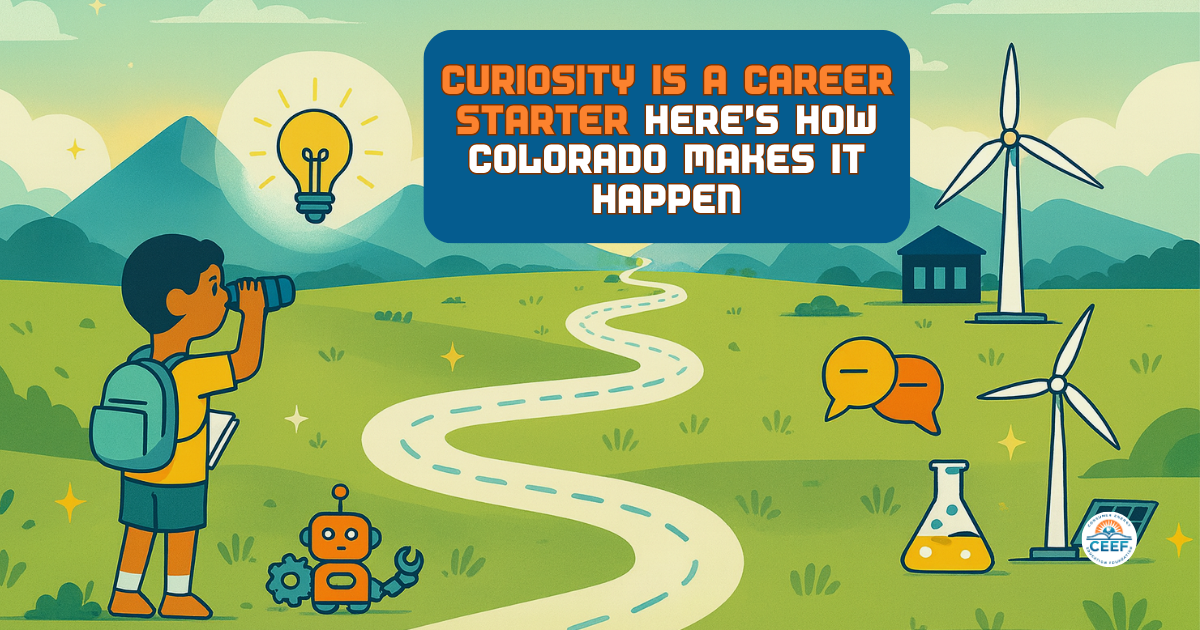
If you’ve ever taken a toy apart just to see how it worked, or wondered how your lights stay on even in a storm, you’re already thinking like a scientist. In Colorado, curiosity like that can spark a lifelong adventure, one that starts in the classroom and leads to real-world energy innovation
Start Exploring STEM in School
Every great inventor, engineer and energy problem-solver starts with asking simple questions. What if? How come? Could this work better? In Colorado schools, STEM (science, technology, engineering and math) turns those questions into projects and experiments.
K-12 schools across the state offer classes that make learning hands on. Robotics clubs teach design and teamwork, coding labs show how a computer “thinks” and environmental science classes connect what happens in nature to what happens in your own home.
Student Tip: Ask your teacher if your school has a science fair or STEM challenge programs. Even building a small solar oven from cardboard and foil is a real engineering project!
Choose Energy-Focused Opportunities
Colorado’s mountains and plains are full of energy stories, from wind farms and hydropower dams to high tech research labs in Denver and Golden. Choosing electives that match up to these real examples can help you imagine where STEM could take you. These real-world examples help students see how their classes translate into future careers.”
If chemistry interests you, try classes about renewable energy or materials science. If you enjoy math, dive into physics or statistics to understand how power grids balance supply and demand. If you’re drawn to art and design, explore architecture or environmental design. The energy world needs creative thinkers too.
Parents can help by encouraging exploration, not perfection. Having a “just try it” approach often uncovers hidden strengths that grades alone can’t measure.
Connect With Mentors and Role Models
One of the best ways to understand what a STEM career looks like is to talk to someone who’s living it. Colorado has national laboratories, energy companies and nonprofits that welcome student curiosity. Programs like the Girls Inc. of Metro Denver’s Eureka, STEMblazers and NREL’s educational outreach let students meet scientists and engineers, ask questions and even tour working facilities.
Mentors can be teachers, older students or professionals who remember the feeling of being curious and unsure. A short conversation with someone can make the future feel real, and reachable.
Try this: Start by writing down one question you’ve always wondered about—big or small. Then ask a teacher or local organization who might know someone to help you find the answer. Curiosity is your ticket to connection.
Keep building your path
STEM isn’t a single lane — it’s a network of trails, just like hiking a mountain. You might start with a fascination for coding and end up designing smarter energy grids. You might love art and discover a passion for sustainable design. The key is to keep experimenting, asking and exploring.
Colorado offers a full pathway from classroom curiosity to college and career:
- High school programs that include dual-credit STEM courses or technical training.
- Community colleges with certificates in solar technology, energy management or environmental science.
- Universities leading national research in clean energy, aerospace and advanced materials.
Each stop along the way builds skills that power real change. And every project you try in school can grow into something bigger. Parents can help by encouraging kids to try new things, explore different STEM subjects, and celebrate progress over perfection.
Your STEM story starts here
STEM is not just about the equations and experiments. It’s about solving problems that matter: keeping homes warm, cars efficient and communities thriving. Colorado’s energy innovators were once curious students too.
Whether you’re sketching innovations in a notebook, building your first circuit or joining a science club, remember that you’re already on the path. Stay curious, keep asking questions and watch how your classroom discoveries can light up a career that powers the future.
